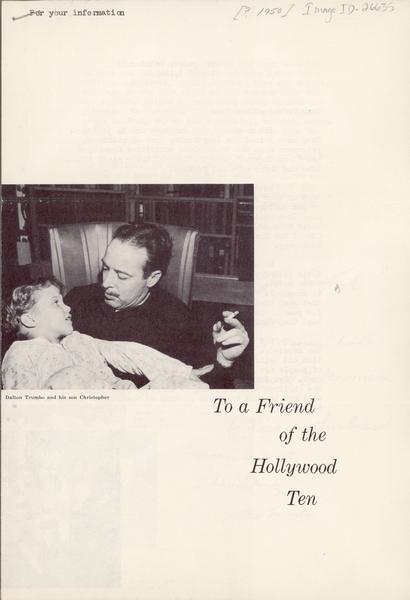
The Hollywood Blacklist began in 1947 when studios and producers began to refuse to employ Trumbo and members of the Hollywood Ten. Their ban was enforced by the Screen Writers’ Guild Trumbo had once headed. Documents from the collection show that Trumbo’s bank accounts were empty or overdrawn by the early 1950s. When he returned from prison in 1951, Trumbo sold his ranch in California and moved into exile with his family in Mexico. Documents from the collection suggest that while he wanted desperately to return to work, rather than set a precedent of denouncing political ideology and informing on colleagues, Trumbo made it his priority to find work however he could while also attempting to break the Blacklist with legitimate work when he could.
Trumbo was a pioneer of the Hollywood black market, working out clever schemes for “under the counter” writing work for himself and circulating information to other blacklisted writers on how to make it work. As an uncredited writer or editor, often under assumed names and behind fronts, Trumbo wrote dozens of scripts for the screen and the stage throughout the 1950s, as well as some print fiction. Trumbo was able to find regular work and make a decent income once he moved back to Los Angeles from Mexico in 1954. Two of Trumbo’s black market screenplays won Academy Awards for other writers: Roman Holiday (1953), credited to Ian McLellan Hunter, and The Brave One (1956), credited to Robert Rich.
Many suspicions surrounded the Oscar awarded to Robert Rich in 1957. In a move that drew critical attention to the Blacklist, Trumbo admitted in 1959 that he had written the script. That same year, Otto Preminger publicly announced that Trumbo would write the screenplay for Exodus (1960). Shortly thereafter Kirk Douglas revealed that Trumbo had written the screenplay for Spartacus (1960). After Trumbo’s name appeared on both of these films, the Blacklist was effectively broken and, though still amid controversy, he was able to work openly again in Hollywood. Trumbo finished his career by authoring such acclaimed films as Lonely Are the Brave (1960), Hawaii (1966), and Papillon (1973) in his own name, as well as adapting his own Johnny Got His Gun (1971) for the screen. Trumbo remains the most prominent of the Hollywood Ten and one of the central figures in the story of mid-century American anti-Communist hysteria.
Digital Documents
Letter from Mexico describing dire financial situation (1953)
Letter arranging black market deals (1951)
Notes on income tax investigation, describing black market arrangements and finances (1961)
Related Links:
